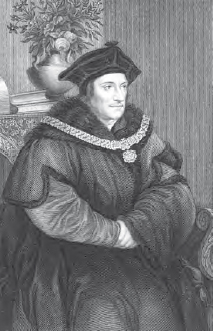Neoplatonism Through the RenaissanceRenaissance Humanism |
Was Thomas More serious about his utopian vision? |
Although Sir Thomas More (1478–1535; later, St. More), was strongly influenced by Desiderius Erasmus’ (1466–1536) mockery of scholasticism, his ideas in his most important work, Utopia, are quite sober and serious. The work itself became a model for modern descriptions of the ideal society. Like Erasmus, More returned to Greek philosophy and early Christianity for ideals of human life. More sought inspiration from Epicurus (341–271 B.C.E.), and, like his guide, extolled simple and natural pleasures among friends with the same tastes.
The principal narrator of Utopia is Raphael Hythlodaeus, a well-traveled philosopher who is fond of Plato, Plutarch, and Aristotle, as well as the Roman intellectuals Seneca and Cicero. The island of Utopia is a completely egalitarian, communistic society. Reflecting More’s values, Utopia favors rights for women, traditional families, and a reliance on Christian virtues to support its main purpose of achieving happiness for all in their earthly lives.

